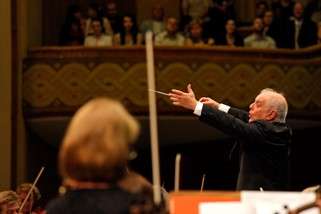|
Back
Bruckner’s Enormous Eighth New York
Stern Auditorium, Carnegie Hall
01/28/2017 -
Anton Bruckner: Symphony No. 8 in C minor
Staatskapelle Berlin
Daniel Barenboim (conductor)

D. Barenboim (© Thomas Bartilla)
“a contemplative magnificence of mind beyond the battle”
Robert Simpson, The Essence of Bruckner
If you could somehow go back in time and attend one concert, what would it be? The unveiling of Beethoven’s 5th and 6th symphonies on the same program (with the numbers reversed)? The riotous premiere of The Rite of Spring including the very public walkout of Camille Saint-Saëns? The Schoenberg concert that had to be halted due to audience hyper-violence? For me it would have to be the evening when Anton Bruckner employed his legendary improvisatory skills to combine passages from his new C minor Symphony with snatches of delights from his idol Richard Wagner.
The deNazification of the Bruckner symphonies – including excising all of the Wagner references from the “Wagner” symphony – and the subsequent counter-reformation to restore the “purity” of the original texts were all hashed out long after the death of the composer. But during his lifetime, the combination of well-meaning friends and students (including Gustav Mahler) and Bruckner’s own deep-seated insecurities produced a large number of versions of symphonies 1 through 8 (a stronger force may have had a hand in the perceived incompleteness of the 9th).
When Maestro Welser-Möst brought the original version of this symphony to Lincoln Center in 2011 it sounded so totally different as to inspire Alex Ross to state in the New Yorker that it was “a wild ride through the Brucknerian subconscious”. Truly a shock to the system for us old Bruckner scholars and one that shook to its very bones. How different – and probably inferior – his output might have been if he had possessed a more self-confident inner strength, rather than his almost childlike susceptibility to criticism and insecurity.
This current concert’s program booklet listed this effort as the “original version” on its title page, but just a few minutes into the performance it was clear that this appellation was not justified. Rather what we heard was the Robert Haas edition from 1939, a very different animal. A deep dive into the handout revealed that Haas has employed much material from the original (of course, so did everyone else who published a revised treatment!) Mystery solved.
The performance was a tad on the disappointing side. It sounded as if these stalwart travelers were justifiably fatigued, having now presented eight evenings of intense music in just nine calendar days. They fly home tomorrow after an afternoon presentation of the 9th. In any event, the balance between dominant strings and recessive winds, brass and percussion was a bit off, many of this reviewer’s favorite colorful moments extremely difficult to experience in the ear as well as the imagination. The middle movements (Scherzo and Adagio) felt underpowered and a bit sloppy. Such a shame, as these semi-hidden effects are as memorable as any in the rich history of Romantic music. If this were any particular audience member’s first hearing of the piece, or, even worse, of Bruckner at all, then this reading provided a rather striking disservice.
Those present in the cathedral who heard Bruckner at the organ interweave Wagnerian themes, mostly from Siegfried’s Funeral, with passages from his own Symphony No. 8 were profoundly moved by the improvisation. Earlier, when Bruckner was told of his mentor’s death, he paused in his work on the 7th Symphony to fashion what amounts to a coda for the Adagio that expresses his sorrow in extremis. From the 7th forward, the Upper Austrian yokel began to fashion music arguably more gut-wrenching than any previously created (there is something about that mountainous rarified atmosphere – one hears this same anguish in Webern). This, in the end, may be the center of the emotional power of Anton Bruckner.
Fred Kirshnit
|